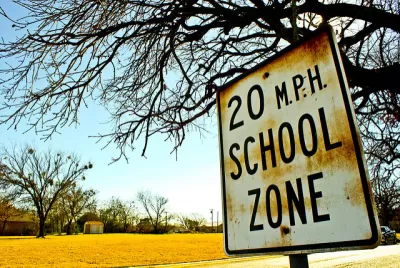Portland has implemented one of the most sweeping commitments to traffic safety of any city in the United States: 20 mph speed limits over the vast majority of the city's streets.

"To improve traffic safety and make streets more welcoming for walking and biking, Portland will lower speed limits on nearly all of its residential streets to 20 miles per hour, in most cases replacing a 25 mph limit," reports Angie Schmitt.
According to Schmitt, the 70 percent of the city's collected miles of streets will now be subject to the 20 mph speed limit. Portland, like many other cities around the country, needed permission from the State legislature to lower its speed limits. Once it had that permission, the Portland City Council approved the lower speed limits unanimously.
The action by the Portland City Council is perhaps the most sweeping of any similar efforts around the country, though Portland is not the first city in the country or in the world to lower speed limits in the name of traffic safety. For more background on the movement, here is a list of articles on the subject:
FULL STORY: Portland Will Reduce Residential Speed Limits to 20 MPH

Trump Administration Could Effectively End Housing Voucher Program
Federal officials are eyeing major cuts to the Section 8 program that helps millions of low-income households pay rent.

Planetizen Federal Action Tracker
A weekly monitor of how Trump’s orders and actions are impacting planners and planning in America.

Ken Jennings Launches Transit Web Series
The Jeopardy champ wants you to ride public transit.

Crime Continues to Drop on Philly, San Francisco Transit Systems
SEPTA and BART both saw significant declines in violent crime in the first quarter of 2025.

How South LA Green Spaces Power Community Health and Hope
Green spaces like South L.A. Wetlands Park are helping South Los Angeles residents promote healthy lifestyles, build community, and advocate for improvements that reflect local needs in historically underserved neighborhoods.

Sacramento Plans ‘Quick-Build’ Road Safety Projects
The city wants to accelerate small-scale safety improvements that use low-cost equipment to make an impact at dangerous intersections.
Urban Design for Planners 1: Software Tools
This six-course series explores essential urban design concepts using open source software and equips planners with the tools they need to participate fully in the urban design process.
Planning for Universal Design
Learn the tools for implementing Universal Design in planning regulations.
Heyer Gruel & Associates PA
Ada County Highway District
Institute for Housing and Urban Development Studies (IHS)
City of Grandview
Harvard GSD Executive Education
Toledo-Lucas County Plan Commissions
Salt Lake City
NYU Wagner Graduate School of Public Service




























